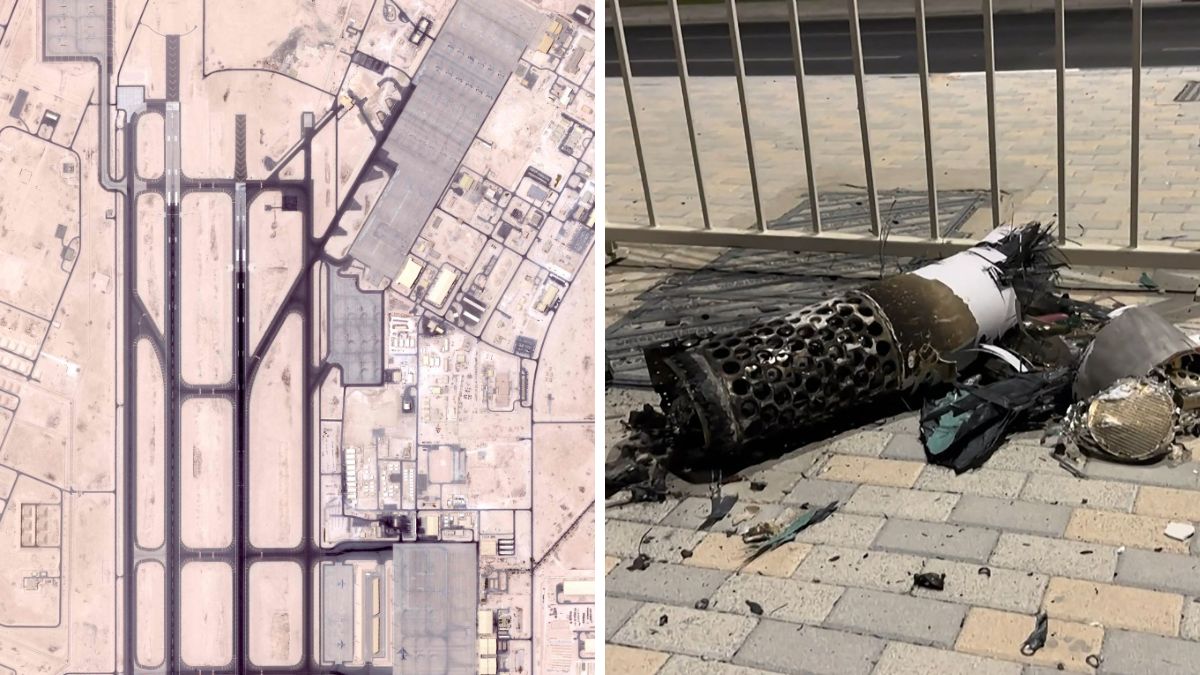Why Iran’s attack on US base in Qatar was a carefully choreographed one
 Satellite photo from Planet Labs PBC on June 19, 2025, shows no more planes at the US military base of Al-Udeid in Qatar, which was targetted by Iran. (Right) AFPTV footage shows the remnants of an Iranian missile intercepted over Qatar, as it lies on a pavement near a fence | AFP
Satellite photo from Planet Labs PBC on June 19, 2025, shows no more planes at the US military base of Al-Udeid in Qatar, which was targetted by Iran. (Right) AFPTV footage shows the remnants of an Iranian missile intercepted over Qatar, as it lies on a pavement near a fence | AFP
Iran’s missile strike on a US air base in Qatar on Monday appeared to be a choreographed balancing act in response to Washington’s earlier bombing of its nuclear facilities, echoing Tehran’s retaliation after the 2020 killing of General Qassim Suleimani. Though 14 missiles were launched at Al Udeid, the largest American military installation in the Middle East, President Donald Trump said 13 were intercepted and no lives were lost.
Trump, in fact, took to Truth Social shortly after the attack, thanking Iran for giving the US advance warning. "I want to thank Iran for giving us early notice, which made it possible for no lives to be lost, and nobody to be injured," he wrote. The president did not elaborate on how or when the warning was received, but the statement confirmed speculation that Iran sought to avoid American casualties.
Diplomatic sources told multiple American news sources that the strike had been anticipated. Over the weekend, Qatari and US officials reportedly met to prepare for such an eventuality. The Iranian missile barrage was seen as proportionate to the number of bombs used by the US during its strikes on June 21, a deliberate signal from Tehran that it wished to retaliate without sparking a broader war.
Iran had numerous options at its disposal, including US targets in Iraq, Syria and the UAE, as well as naval assets in the Persian Gulf, the Red Sea and the Eastern Mediterranean. But by targeting Al Udeid, far from Qatari residential areas, Iran appeared intent on limiting civilian risk and regional fallout. Iran’s Supreme National Security Council insisted the strike posed "no threat to our friendly and brotherly country, Qatar, and its noble people."
Satellite imagery showed the base had been largely cleared of aircraft prior to the attack, supporting claims that prior warning had been shared. A US military spokesperson said the one missile not intercepted had landed harmlessly. The State Department issued a temporary shelter-in-place warning for Americans in Qatar, while Doha briefly closed its airspace. Some foreign oil companies evacuated staff from sites in Iraq.
The strike recalled the events of January 2020, when Iran launched ballistic missiles at US forces in Iraq following the assassination of General Suleimani. Then, too, Iran gave advance warning to the Iraqi government. The strike caused no fatalities at the time, although it was later revealed that over 100 American personnel had suffered traumatic brain injuries. After that response, Iran’s foreign minister said the country had "concluded proportionate measures in self-defence" and did not seek escalation.
This week’s attack follows the same pattern. By striking a key US base yet causing minimal damage and no casualties, Iran aimed to preserve its credibility without inviting an all-out war. Tehran is under pressure to respond forcefully to external aggression but is also wary of entangling itself in a conflict that could destabilise the regime.
The choice of Al Udeid, the prior coordination with Qatari officials and the evident effort to minimise human cost all point to a desire to contain the crisis. Gulf states remained on edge, with Bahrain warning citizens to stick to main roads and the UAE grounding flights. Yet shipping through the Strait of Hormuz remained largely unaffected, underscoring the limited nature of the strike.
Iran also has broader strategic considerations. It counts China as a key partner and is unlikely to disrupt regional energy flows that would displease Beijing. With Trump continuing to express interest in negotiations, Iran appears to be keeping the door open.
"Iran retaliated, but they did so in a way that speaks more to restraint than revenge," a senior European diplomat said. "That tells you they’re still looking for an off-ramp."
Middle East